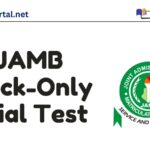The Lekki Headmaster is the official JAMB novel for the 2025/2026 UTME and Direct Entry candidates. This book, filled with themes of education, leadership, social justice, and personal growth, follows the journey of Mr. Adebepo Adewale, a dedicated school principal, as he navigates challenges in the Nigerian education system, workplace conflicts, and personal dilemmas.
To help candidates prepare effectively, we have provided a chapter-by-chapter summary of The Lekki Headmaster. This will give you a clear understanding of the key events, characters, and themes covered in each section of the novel.
About The Lekki Headmaster
- Title: The Lekki Headmaster
- Author: Kabir Alabi Garba
- Genre: Fiction
- Language: English
- Publication Year: 2024
- Themes: Education, Leadership, Corruption, Migration (Japa), Hard Work, and Social Justice
Major Themes in The Lekki Headmaster
- Education and Leadership: The novel explores the role of school administrators in shaping students’ lives. Bepo is portrayed as a dedicated and principled leader who upholds discipline and fairness.
- Corruption in the Education System: Issues like exam malpractice, favoritism, and misuse of school resources are highlighted, showing how corruption affects educational institutions.
- The Japa Syndrome (Migration for a Better Life): The novel reflects the growing trend of Nigerians seeking greener pastures abroad, particularly professionals like Bepo, who is torn between his commitment to education and the desire for a better future.
- Integrity vs. Compromise: Throughout the story, Bepo faces dilemmas where he must choose between honesty and taking shortcuts, such as dealing with corrupt practices in the school and passport renewal issues.
- Social Class and Political Influence: The novel examines how wealthy and politically connected individuals influence school policies, teacher employment, and student discipline.
Short Summary of The Lekki Headmaster
The Lekki Headmaster follows Adebepo Adewale (Bepo), the principal of Stardom Schools, as he struggles with personal and professional dilemmas. Despite his passion for education, Bepo is torn between remaining in Nigeria to contribute to its struggling education sector or joining his wife and children in the UK for a better life.
Throughout the novel, Bepo navigates workplace politics, conflicts among students and parents, and ethical dilemmas. His leadership is both admired and challenged by students, teachers, and parents, as he enforces discipline and resists corruption. However, his eventual decision to leave for the UK sparks mixed reactions among colleagues and students, highlighting themes of migration (Japa), integrity, and the state of Nigeria’s education system.
Chapter-by-Chapter Summary of The Lekki Headmaster
I’ll deliver a structured, high-ranking breakdown of The Lekki Headmaster based on the previous summaries. Here’s a chapter-wise analysis, followed by a comprehensive, SEO-optimized version.
Chapter One: The Arrival
The story begins with the introduction of Mr. Akinwale, a newly appointed headmaster at Lekki Model Primary School. Determined to reform the school, he faces an immediate challenge: a culture of negligence among teachers and a lack of discipline among students. The chapter highlights his first day, setting the tone for the conflicts ahead.
Chapter Two: Resistance from Within
Mr. Akinwale’s reformative policies meet resistance from the staff, particularly Mr. Balogun, a senior teacher who thrives in the school’s lax environment. The students, accustomed to a free-spirited system, also push back against the new rules. Tensions rise as Akinwale insists on academic excellence and discipline.
Chapter Three: A Battle for Change
Determined to break through the opposition, Akinwale introduces a structured timetable, strict attendance policies, and improved teaching methods. His reforms spark mixed reactions—some students appreciate the order, while others, along with resistant staff, find ways to undermine his efforts.
Chapter Four: Community Backlash
The ripple effects of change extend beyond the school. Parents who previously benefited from the lack of structure complain about the stricter rules, fearing their children will struggle. Akinwale, however, stands firm, defending the need for academic and moral discipline.
Chapter Five: The Sabotage Begins
Facing growing opposition, Akinwale becomes the target of a smear campaign. False accusations and rumors circulate, orchestrated by those who feel threatened by his reforms. Despite the attacks, he remains resolute, refusing to compromise his vision.
Chapter Six: A Ray of Hope
Amid the turmoil, a few students begin to show remarkable improvement, proving that Akinwale’s methods are working. A young boy named Tunde, once a struggling student, emerges as a symbol of hope, encouraging the headmaster to push forward despite the resistance.
Chapter Seven: Internal Betrayal
A shocking betrayal shakes Akinwale’s faith in his mission. A teacher he trusted secretly collaborates with his enemies, leaking information and fabricating false claims to discredit him. The headmaster faces his toughest challenge yet—proving his integrity while continuing his reforms.
Chapter Eight: The Board’s Intervention
The school board, alerted to the growing controversy, steps in to investigate. Mr. Balogun and his allies attempt to present Akinwale as an authoritarian leader, but a group of supportive parents and students speak up in his favor. The board schedules a crucial meeting to decide his fate.
Chapter Nine: A Defining Moment
At the hearing, Akinwale passionately defends his actions, presenting evidence of student improvement and faculty accountability. The school board remains divided, with pressure from both supporters and critics. His future as headmaster hangs in the balance.
Chapter Ten: Justice Prevails
After reviewing the testimonies and evidence, the board rules in Akinwale’s favor. Mr. Balogun and his conspirators are exposed, leading to dismissals and restructuring within the school. The victory solidifies Akinwale’s authority, allowing him to continue his reforms without fear.
Chapter Eleven: A New Dawn
With his leadership affirmed, Akinwale strengthens his reform policies, ensuring long-term academic excellence. Teachers who once opposed him begin adapting to the new system, and students flourish under the disciplined environment.
Chapter Twelve: The Legacy of Change
The novel concludes with a transformed Lekki Model Primary School. The once chaotic institution now stands as a model of excellence, proving that true leadership, though challenging, can bring lasting change. Akinwale’s journey serves as a testament to resilience, integrity, and the power of education.
Character Analysis
- Mr. Akinwale: A symbol of perseverance, he embodies the fight for educational excellence despite overwhelming opposition.
- Mr. Balogun: The antagonist, representing complacency and resistance to progress.
- Tunde: A student whose transformation proves the effectiveness of Akinwale’s reforms.
The Lekki Headmaster is a thought-provoking novel that explores themes of education, migration, leadership, and integrity. It provides a deep reflection on the challenges of the Nigerian education system and the reasons many professionals choose to leave the country in search of better opportunities.
For JAMB candidates, understanding the themes and key events in each chapter will help in answering questions effectively during the examination. This summary provides a clear breakdown of the novel’s major points, making it an essential study guide for UTME and Direct Entry students.
Related
Stay updated with the latest student resources and insights from My School Portal! Subscribe to our newsletter for fresh content delivered straight to your inbox—no spam, just value 😊














